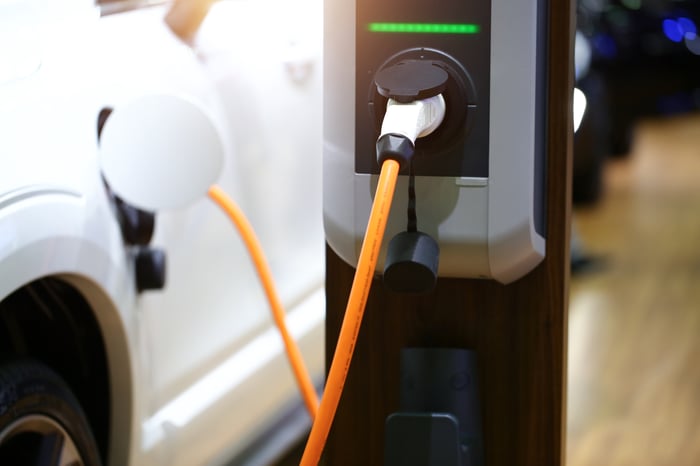When the curtain closes on 2021, there's no question it'll be remembered as the year retail investors put Wall Street on notice.
Even though retail investors have been putting their money to work in the market for more than a century, we've never before seen their efforts to drive up the valuations in equities translate to such impressive results.

Image source: Getty Images.
Meme stocks come into focus
While not an all-encompassing description, retail investors from Reddit and other social media chatrooms have been banding together and seeking out stocks with high levels of short interest. Since a large percentage of short-sellers are institutional investors or hedge funds, the rise of the retail investor has taken on the feel of a David vs. Goliath battle.
Specifically, these retail traders are attempting to effect short squeezes in heavily short-sold stocks. This creates an event where short-sellers run for the exit, causing a rapidly rising stock to skyrocket higher as short-sellers buy to cover their position. Video game and accessories retailer GameStop is the perfect example of what can happen when the conditions are absolutely perfect for a short squeeze.
The companies Reddit retail traders are focusing on have come to be known as meme stocks. That's because they're valued for their social media popularity, not their (often poor) operating performance.
The big question is: Which companies are set to become the next meme stocks coveted by Reddit's WallStreetBets community?
While no one knows that answer with any certainty, here are three of my best guesses.

Image source: Getty Images.
Blink Charging
First up is electric-vehicle (EV) charging products and services network Blink Charging (BLNK 5.52%).
Why Blink? To begin with, Reddit investors are often younger, and young people are more likely to demand action be taken to curb climate change. Beyond just pushing away from fossil fuels, ancillary players like Blink Charging will need to step in to help provide the infrastructure for an army of EVs that'll be hitting the roadways in the coming years.
The other notable factor is the combination of short interest and short ratio (also known as "days to cover"). As of May 28, Blink had nearly 12.5 million shares held short and a float of 35.9 million shares. That's a short interest relative to float of 35%. More importantly, Blink Charging has seen just shy of 3.5 million shares trade hands daily over the past three months. This suggests it would take more than three full days for short-sellers to exit their positions, should they choose to do so.
However, Blink certainly fits the definition of "meme stock" if you get a closer look at its operating performance. The company produced (drum roll) only $2.23 million in sales during the first quarter (it's a $1.62 billion company, for context). Comparatively, operating expenses, including compensation, more than doubled, leading to a $7.39 million operating loss.
But what might scariest of all is that the company's balance sheet gives no indication that it's putting its cash to work on research and development. The entire EV space (cars and ancillary products/services) is dependent on innovation. With acquisitions as its only weapon, Blink Charging will likely struggle over the long run.

Image source: Getty Images.
Dave & Buster's
Although it's been off the radar on the WallStreetBets chat boards, entertainment and dining chain Dave & Buster's (PLAY 1.19%) may well be the next meme stock. If anything, the company's ticker symbol (PLAY) is the perfect kick-starter for retail investors.
Similar to Blink, there are two reasons it'd make a perfect meme stock. First of all, retail traders are big fans of left-for-dead turnaround stocks in the wake of the pandemic. There were serious concerns last year that Dave & Buster's might not survive. But more than a year after the coronavirus pandemic was declared, things look to be perking up. Strong adult vaccination uptake in the U.S. and relaxed coronavirus restrictions in many states has resulted in positive operating income before depreciation and amortization in 127 of its 138 stores, as of May 2, 2021.
The other catalyst, as you might expect, is the right recipe for a short squeeze. As of May 28, a little over 7.8 million shares of the company were held short. That may not sound like much, but Dave & Buster's only has 42.4 million shares in its float. This works out to a short interest of over 18%.
Yet what really stands out is its muted average daily volume of 1.36 million shares. It would take almost six full days for short-sellers to cover their positions, based on this three-month volume data. That's a recipe to get pessimists worried.
But keeping with the theme of meme stocks, Dave & Buster's still isn't out of the woods on an operating basis. Selling stock and taking on debt absolutely helped the company make it through the worst part of the pandemic. Then again, interest expenses totaled 5.6% of net sales in the first quarter, up from just 1.1% of total sales in the first quarter of 2019.
Equally worrisome, the company's current liabilities ($279.2 million) are well over double its current assets ($111.4 million). This suggests Dave & Buster's doesn't have the capital necessary to meet its expense obligations over the next 12 months. An improving economy could help these figures immensely, but its future remains dicey, at best.

Image source: Getty Images.
Intercept Pharmaceuticals
It's also possible that small-cap biotech stock Intercept Pharmaceuticals (ICPT) becomes the next Reddit meme stock.
One reason retail investors are bound to like Intercept is its volatility. Intercept's beta is north of 1.5, which means that, on average, it moves more than 50% more than the broader market. For example, if the benchmark S&P 500 rises 1%, we would expect to see Intercept up more than 1.5%. The same is true when the broader market moves down, as well.
Additionally, Intercept is the perfect candidate for a short squeeze. As of May 28, just over 6 million shares were held short. Again, doesn't sound like much -- but it's quite a bit when the total float is only 28.3 million shares. This equates to a short interest of 21%. It's also worth noting is that Intercept only sees an average of 1.11 million shares trade hands daily. Thus, it would take well over five days for short-sellers to completely exit their positions.
However, as a shareholder of Intercept I can also attest that there are justifiable reasons for people to be pessimistic. Last year, the U.S. Food and Drug Administration (FDA) sent the company a Complete Response Letter for obeticholic acid (OCA) as a treatment for nonalcoholic steatohepatitis (NASH). To boot, it's had a more stringent black-box warning added to Ocaliva, an approved treatment for primary biliary cholangitis.
If things are so bad, why hold? My expectation has always been that OCA would get the nod for NASH, even if it's only for a small subset of the sickest patients. Since there are no approved treatments for NASH, this gives Intercept an even better case for approval. The issue is that it could be a while before additional clinical data is available for the company to make another run at FDA approval.




